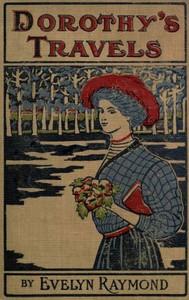|
|
Read this ebook for free! No credit card needed, absolutely nothing to pay.Words: 33000 in 6 pages
This is an ebook sharing website. You can read the uploaded ebooks for free here. No credit cards needed, nothing to pay. If you want to own a digital copy of the ebook, or want to read offline with your favorite ebook-reader, then you can choose to buy and download the ebook.

: Blackwood's Edinburgh Magazine - Volume 62 No. 384 October 1847 by Various - Scotland Periodicals; England Periodicals Blackwood's Edinburgh Magazine@FreeBooksWed 07 Jun, 2023 cording to him, labour was every thing, inspiration a mere name; and he affirmed that, in art, all things should be subjected to the severest rules. Fame can give no satisfaction to one who has not earned, but stolen it. It produces a constant thrill only in the heart conscious of having deserved it. Tchartk?ff no longer valued fame. All his feelings and desires were turned towards gold. Gold became his passion, his delight, the object of his being. Bank-notes filled his portfolios, piles of gold his coffers; but, like all avaricious men, he grew sour, selfish, inaccessible to every thing but money--cold-hearted and penurious. He was gradually sinking into an unhappy miser, when an event came to pass which gave his whole moral being a terrible and awakening shock. Returning home one day, Tchartk?ff found lying on his table a letter, in which the Academy of Arts invited him, as one of its most distinguished members, to give his opinion of a new picture just arrived from Italy, the work of a Russian artist who had long studied there. The painter, who had been a schoolfellow of Tchartk?ff's, imbued, even as a boy, with a fervent passion for art, had early torn himself from home and friends, from all the pleasures and habits of his age and country, to toil and study in the renowned Italian city, whose very name thrills the painter's heart. There he condemned himself to solitude and uninterrupted labour. Men spoke of his eccentricity, of his ignorance of the world, of his neglect of all the customs of society, of the disgrace he cast on the artist's profession by his dress, which was beneath his station, and by his frugality, which was almost penury. He cared nothing for scoff and reproach. Regardless of the world's comments, he gave himself up to his art. Unweariedly did he haunt the galleries; hour after hour, day after day, he stood before the works of the great masters, striving to penetrate their secrets. He never finished a picture without comparing it many times with the productions of those mighty teachers, and reading in their creations silent but eloquent counsel. He engaged in no arguments or disputes, but accorded to every school the honour it deserved; and after aiming at acquiring what was most meritorious in each, at length addicted himself to the study of the immortal Raphael; like a student of letters, who, after reading and rereading the works of a multitude of authors, at last confines himself to the writings of one whom he conceives to unite the chief beauties of all the others, superadding graces none of them possess. After many years of persevering application and gradual progress, the artist left the schools, possessing pure and elevated ideas of composition, great powers of conception, and an execution that charmed alike by its delicacy and force. But, with the modesty of true genius, he still allowed a considerable time to elapse before he ventured to submit a picture to the verdict of his countrymen. On entering the exhibition-room, Tchartk?ff found it thronged with visitors, grouped before the painting. Silence, such as is rarely met with amongst a numerous collection of amateurs, reigned throughout the crowd. Assuming the knowing and supercilious look of an acknowledged connoisseur, he approached the picture, prepared to cavil and find fault, or, at best, to damn with faint praise. But the canting phrase of conventional criticism died away upon his lips at the sight he there beheld. Faultless, pure, gracious, and beautiful as some fair and virgin bride was the noble production of genius that met his astonished gaze. With wonder and admiration he recognised the work of a pencil that revived the glories of ancient art. A profound study of Raphael was manifest in the noble elevation of the attitudes; there was a something Correggian in the skilful handling and careful finish. But there was no servile imitation of any painter; the artist had sought and found in his own soul the divine spark that gave life to his creation. Not an object in the picture, however trifling, but had been the subject of a profound study; the law of its constitution had been analysed, and its internal organism investigated. And the painter had caught that flowing roundness of line which pervades all nature, but which no eye ever sees save that of the creator-artist--that roundness which the mere copyist degrades into points and angles. He had poetised, whilst faithfully representing, the commonest objects of external nature. A feeling of awe mingled with the admiration that kept the crowd profoundly silent. Not a whisper was heard, not a rustle or a sound, for some time after the arrival of Tchartk?ff. All were absorbed in contemplation of the masterpiece; and in the eyes of the more enthusiastic tears of delight were seen to glisten. Tchartk?ff himself stood open-mouthed and motionless before the wonderful painting, whose merits and beauties the spectators at last began to discuss. He was roused from abstraction by being appealed to for his opinion. In vain did he strive to resume his dignified air, and to give utterance to the musty commonplace of criticism. The contemptuous smile was chased from his features by the workings of emotion; his breast heaved with a convulsive sob, and after a moment's violent but ineffectual struggle, he burst into tears and rushed wildly from the hall. A few minutes later he stood motionless, almost paralysed, in his own magnificent studio. The bandage had fallen from his eyes. He saw how he had squandered the best years of his youth; how he had trampled and stifled the spark of that fire once burning within him, which might have been fanned till it blazed up into grandeur and glory, and extorted tears of gratitude and admiration from a wondering world. All this he had sacrificed and thrown away, heedlessly, madly, brutally. There suddenly revived in his soul those enthusiastic aspirations he once had known. He caught up a pencil and approached a canvass. The sweat of eagerness stood upon his brow; his soul was filled with one passionate desire--one solitary thought burned in his brain. The zeal for art, the thirst for fame he once so strongly felt, had suddenly returned, evoked from their lurking-place by the mute voice of another's genius. And why, Tchartk?ff thought, should not he also excel? His hand trembled with feverish impatience till he could scarcely hold the pencil. He took for his subject a fallen angel. The idea was in accordance with his frame of mind. But, alas! how soon he was convinced of the vanity of his efforts! His hand and imagination had been too long confined to one line and limit, and his fierce but impotent endeavour to overleap the barrier, to break his self-imposed fetters, had no result. He had despised and neglected the fundamental condition of future greatness--the long and fatiguing ladder of study and reflection. Maddened by disappointment, furious at the conviction of impotency, he ignominiously dismissed from his studio all his later and most esteemed productions, to which places of honour had been accorded--all his lifeless, senseless, fashionable portraits of hussars, ladies of fashion, and privy councillors. He then shut himself up, denied himself to all visitors, and sat down to work, patient and eager as a young student. For a while he laboured day and night. But how unsatisfactory, how cruelly ungrateful was all that grew under his pencil! Each moment he found himself checked and repulsed in the new path he fain would have trodden by the wretched mechanical tricks to which he had so long habituated himself. They stood on his road, an impassable barrier. In spite of himself he recurred to the old commonplace forms; the arms would arrange themselves in one graceless position; the head assume the old hackneyed attitude; the folds of dress refused to drape themselves otherwise than they had so long been wont to do in his hands. All this the unhappy artist plainly felt and saw. His eyes were opened to his heinous faults, but he lacked the power to correct them. Covering his face with his hands, Tchartk?ff stood silent, full of bitter thoughts, rapidly but minutely reviewing the whole of his past life. When he removed his hands he started, and a thrill passed over him, for he suddenly encountered the gaze of two piercing eyes glittering with a sombre lustre, and seeming to watch and enjoy his despair. A second glance showed him they belonged to the strange portrait which he had bought, many years before, in the Stch?kin Dvor. It had remained forgotten and concealed amidst a mass of old pictures, and he had long since forgotten its existence. Now that the gaudy, fashionable pictures and portraits had been removed from the studio, there it was, peering grimly out from amongst his early productions. Tchartk?ff remembered that, in a certain sense, this hideous portrait had been the origin of the useless life he had so long led and now so deeply deplored; that the hoard of gold discovered in its frame had developed and fostered in him those worldly passions, that sensuality and love of luxury, which had been the bane of his genius. Calling his servants, he ordered the hateful picture to be taken from the room, and bestowed where he should never again behold it. Its departure, however, was insufficient to calm his agitation and quell the storm that raged within him. He was a prey to that rare moral torture sometimes witnessed when a feeble talent wrestles unsuccessfully to attain a development above its capacity--a furious endeavour which often conducts young and vigorous minds to great achievements, but whose result to old and enervated ones is more frequently despair and insanity. Tchartk?ff, when convinced of the futility of his efforts, became possessed by the demon of envy, who soon monopolised and made him all his own. His complexion assumed a bilious yellow tint; he could not bear to hear an artist praised, or look with patience at any work of art that bore the impress of genius. On beholding such he would grind his teeth with fury, and the expression of his face became that of a maniac. At last he conceived one of the most execrable projects the human mind ever engendered; and with an eagerness approaching to frenzy, he hastened to put it into execution. He bought up all the best pictures he could find in St Petersburg, and whose owners could be induced to part with them. The prices he gave to tempt sellers were often most extravagant. As soon as he had purchased a picture, and got it safely home, he would set upon it with demoniac fury, tearing, scratching, even biting it; and, when it was utterly defaced and rent into the smallest possible fragments, he would dance and trample on it, laughing like a fiend. The enormous fortune he had accumulated during his long and successful career as a fashionable portrait-painter, enabled him largely to indulge this infernal monomania. To this abominable end he, Tchartk?ff, but a short time before so avaricious, became reckless in his expenditure. For this he untied the strings of his bags of gold, and scattered his rubles with lavish hand. All were surprised at the change, and at the rapidity with which he squandered his fortune, in his zeal, as it was supposed, to form a gallery of the noblest works of art. In the auction room, none cared to oppose him, for all were certain to be outbid. He was held to be mad, and certainly his conduct and appearance justified the presumption. His countenance, of a jaundiced hue, grew haggard and wrinkled; misanthropy and hatred of the world were plainly legible upon it. He resembled that horrid demon whom Pushkin has so ably conceived and portrayed. Save all occasional sarcasm, venomous and bitter, no word ever passed his lips, and at last he became universally avoided. His acquaintances, and even his oldest friends, shunned his presence, and would go a mile round to escape meeting him in the street. The mere sight of him, they said, was enough to cloud their whole day. Fortunately for society and for art, such an unnatural and agitated existence as this could not long endure. Tchartk?ff's mental excitement was too violent for his physical strength. A burning fever and furious delirium ravaged his frame, and in a few days he was but the ghost of his former self. The delirium augmented, and became a permanent and incurable mania, in some of whose paroxysms it was necessary to bind him to his couch. He fancied he saw continually before him the singular old portrait from the Stch?kin Dvor! This was the more strange, because since the day he had turned it out of his studio, it had never once met his sight. But now he raved of its terrible living eyes, which haunted him unceasingly, and when this fancy came over him, his madness was something terrific. All the persons who approached his bed he imagined to be horrible portraits; copies, repeated again and again, of the old man with the fiendish eyes. The image multiplied itself perpetually; the ceiling, the walls, the floor, were all covered with portraits, staring sternly and fixedly at him with living eyes. The room extended and stretched out to a vast and interminable gallery, to afford room for millions of repetitions of the ghastly picture. In vain did numerous physicians seek to discover, with a view to the alleviation of the poor wretch's sufferings, some secret connexion between the incidents of his past life and the strange phantom that thus eternally haunted him. No explanation or clue could be obtained from the patient, who continued to apostrophise the portrait in disconnected phrase, and to utter howls of agony and lamentation. At last his existence terminated in one last horrible paroxysm. His corpse was frightful to behold; of his once comely form, a yellow shrivelled skeleton was all that remained. A few thousand rubles were the sole residue of his wealth; and his disappointed heirs, beholding numerous drawers and closets full of torn fragments that had once composed noble pictures, understood and cursed the odious use to which their relative had applied his princely fortune. A number of carriages, caleches, and dr?jkis were drawn up in the vicinity of a handsome mansion in one of the best quarters of St Petersburg. It had been the residence of a rich virtuoso, lately deceased, and whose pictures, furniture, and curiosities, were now selling by auction. The large drawing-room was filled with the most distinguished amateurs of art in St Petersburg, mingled with brokers and dealers on the look-out for bargains, and with a large sprinkling of those idlers who, without intending to purchase, frequent auctions to kill a morning. The sale was in full activity, and there was eager competition for the lot then up. The biddings succeeded each other so rapidly, that the auctioneer was scarcely able to repeat them. The object so many were eager to possess, was a portrait, which could hardly fail to attract the attention even of persons who know nothing of pictures. This painting, which possessed a very considerable amount of artistical merit, and had apparently been more than once restored, repaired, and cleaned, represented the tawny features of an Oriental, attired in a loose costume. The expression of the face was singular, and by no means pleasant. Its most striking feature was the extraordinary and unaccountable look of the eyes, which, by some trick of the artist, seemed to follow the spectator wherever he went. Every one of the persons there assembled was ready to swear that the eyes looked straight at him; and, what was yet more unaccountable, the effect was the same whether the beholder stood on the right, or on the left, or in front of the picture. This peculiarity it was that had made so many anxious to possess a portrait whose subject and painter were alike unknown. Gradually, however, many of the amateurs ceased their biddings, for the price had become extravagant, and at last only two continued to compete--two rich noblemen, both enthusiastic lovers of the eccentric in art. These still continued the contest, grew heated with their rivalry, and were in a fair way to raise the price to something positively absurd, when a by-stander stepped forward and addressed them. "Before this contest goes farther," he said, "permit me to say a few words. Of all here present, it is I, I believe, who have the best right to the portrait in dispute." "Extraordinary as my words may appear to you," he resumed, perceiving he had fixed the general attention, "I can explain them if you are disposed to give me five minutes' audience. I have every reason to believe that this portrait is one I have long sought in vain." "'You are an artist?' said the intruder, abruptly. "'I am,' replied my father, and wondered what was coming next. Free books android app tbrJar TBR JAR Read Free books online gutenberg More posts by @FreeBooks
: A Poetical Cook-Book by Moss Maria J - Poetry; Cooking American Cookbooks and Cooking@FreeBooksWed 07 Jun, 2023

: Dorothy's Travels by Raymond Evelyn Schneider S Illustrator - Girls Juvenile fiction; Boats and boating Juvenile fiction; Foundlings Juvenile fiction; Travel Juvenile fiction; Ocean travel Juvenile fiction; Musicians Juvenile fiction; Young women Social li@FreeBooksWed 07 Jun, 2023
|
Terms of Use Stock Market News! © gutenberg.org.in2025 All Rights reserved.






